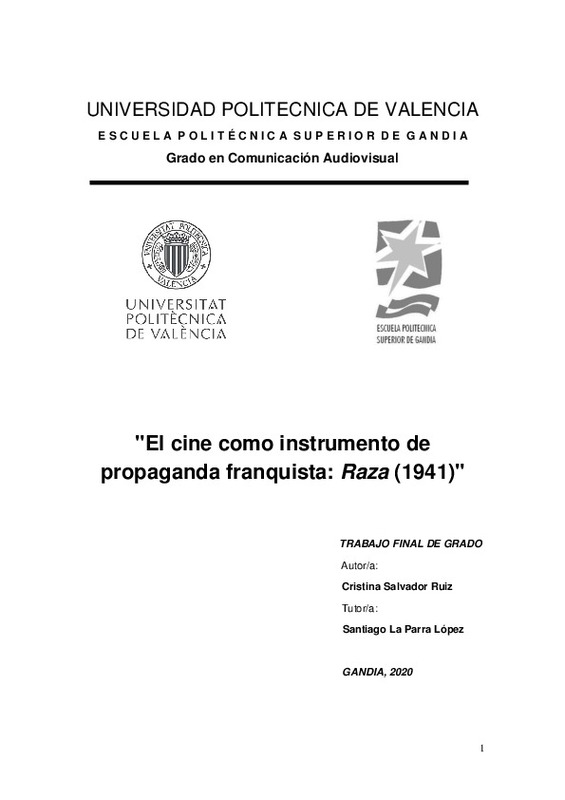JavaScript is disabled for your browser. Some features of this site may not work without it.
Buscar en RiuNet
Listar
Mi cuenta
Estadísticas
Ayuda RiuNet
Admin. UPV
El cine como instrumento de propaganda franquista: Raza (1941)
Mostrar el registro sencillo del ítem
Ficheros en el ítem
| dc.contributor.advisor | La Parra López, Santiago
|
es_ES |
| dc.contributor.author | Salvador Ruiz, Cristina
|
es_ES |
| dc.date.accessioned | 2020-10-15T16:36:25Z | |
| dc.date.available | 2020-10-15T16:36:25Z | |
| dc.date.created | 2020-09-24 | |
| dc.date.issued | 2020-10-15 | es_ES |
| dc.identifier.uri | http://hdl.handle.net/10251/152169 | |
| dc.description.abstract | [ES] Durante la España de la posguerra, el franquismo ve en el séptimo arte, además de un instrumento de propaganda eficaz, un elemento influyente en la sensibilidad de masas a la hora de legitimar el nuevo Régimen. De esta manera, con el objetivo de gobernar y conservar el poder, el Estado diseña una política cinematográfica basada en un sistema de producción de películas que permitan difundir los nuevos valores e instituciones del Régimen. Así pues, con el objetivo de ofrecer la "versión oficial" de la Guerra Civil, Francisco Franco, escondido bajo el seudónimo de Jaime de Andrade, escribe Raza (1941), la película de propaganda franquista más representativa de este "cine de cruzada". Por tanto, el presente trabajo pretende analizar el contenido de las principales películas de propaganda del franquismo para entender cómo y en qué medida es utilizado el cine como arma propagandística con el fin de legitimar los valores que sostienen al nuevo Estado. | es_ES |
| dc.description.abstract | [EN] During the Spanish post-war, the Francoism sees in the seventh art, besides an effective instrument of propaganda, an influential element in the multitudes sensibility in order to legitimise the new regime. In this way, with the objective of ruling the country and preserve the power, the nation draws a cinematographic policy based on a production system of films that could spread the new principles and institutions of the regime. Therefore, focusing on offering the "official version" of the Civil War, Francisco Franco hidden by the pseudonym of Jaime de Andrade, writes Raza (1941) the Francoism propaganda s film which is the most representative one in this propaganda cinema. Thus, the current work tries to analyze the content of the main Francoism propaganda's films to understand how and how much the cinema is used as a propagandistic tool with a view to legitimise the principles that maintain the new State. | es_ES |
| dc.format.extent | 55 | es_ES |
| dc.language | Español | es_ES |
| dc.publisher | Universitat Politècnica de València | es_ES |
| dc.rights | Reserva de todos los derechos | es_ES |
| dc.subject | Raza | es_ES |
| dc.subject | Cine | es_ES |
| dc.subject | Propaganda | es_ES |
| dc.subject | Franquismo | es_ES |
| dc.subject | Guerra Civil Española | es_ES |
| dc.subject | Cinema | es_ES |
| dc.subject | Francoism | es_ES |
| dc.subject | Spanish Civil War | es_ES |
| dc.subject.classification | HISTORIA DEL ARTE | es_ES |
| dc.subject.other | Grado en Comunicación Audiovisual-Grau en Comunicació Audiovisual | es_ES |
| dc.title | El cine como instrumento de propaganda franquista: Raza (1941) | es_ES |
| dc.type | Proyecto/Trabajo fin de carrera/grado | es_ES |
| dc.rights.accessRights | Abierto | es_ES |
| dc.contributor.affiliation | Universitat Politècnica de València. Escuela Politécnica Superior de Gandia - Escola Politècnica Superior de Gandia | es_ES |
| dc.contributor.affiliation | Universitat Politècnica de València. Departamento de Comunicación Audiovisual, Documentación e Historia del Arte - Departament de Comunicació Audiovisual, Documentació i Història de l'Art | es_ES |
| dc.description.bibliographicCitation | Salvador Ruiz, C. (2020). El cine como instrumento de propaganda franquista: Raza (1941). Universitat Politècnica de València. http://hdl.handle.net/10251/152169 | es_ES |
| dc.description.accrualMethod | TFGM | es_ES |
| dc.relation.pasarela | TFGM\132719 | es_ES |
Este ítem aparece en la(s) siguiente(s) colección(ones)
-
EPSG - Trabajos académicos [5004]
Escuela Politécnica Superior de Gandia






